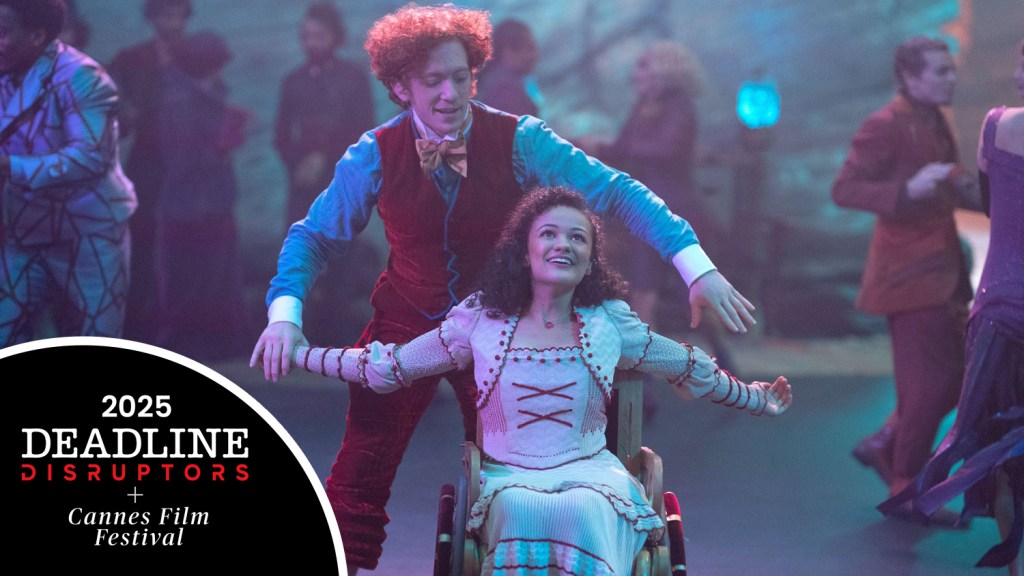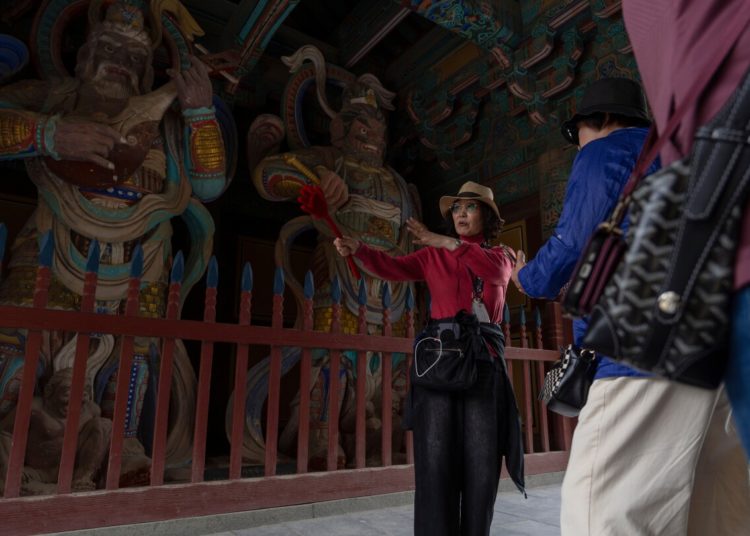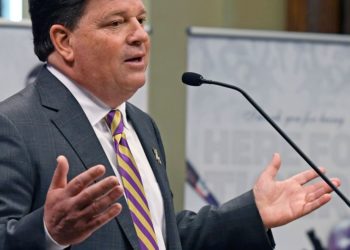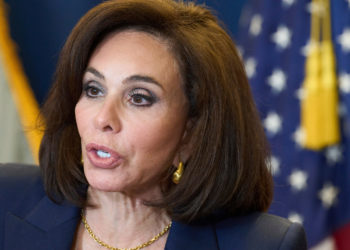Just outside the Motion Picture Association in Washington D.C., the street-wide, two-block letters that spelled out “Black Lives Matter” have been removed. The disappearance of the streetscape, put in place following the George Floyd protests in 2020, is indicative of what’s happened in Trump 2.0 — an all-out war on diversity, equity and inclusion programs, in the government and outside of it. Hollywood has had a varied response, with some entertainment figures speaking out, while studios and their corporate parents have tried to lay low, for now.
But there’s quite a contrast between pre- and post-Trump. Universal’s Wicked, which premiered in November, is still promoted on Comcast’s corporate page for its diversity, equity and inclusion (DEI), including a lead character who uses a wheelchair. By contrast, the March release of Snow White, with Rachel Zegler, a Latina actress, in the lead, put Disney into a bit of a crisis mode amid a loud and emboldened right-wing casting backlash.
Under Trump, the backlash has morphed into one with regulatory implications. The President’s appointee to lead the FCC, Brendan Carr, has launched investigations into the so-called “discriminatory” DEI practices of Comcast and Disney, while suggesting that he would move to block planned mergers of companies still engaged in the practices.
“I want to make sure that your companies are not promoting invidious forms of discrimination in violation of FCC regulations and civil rights laws,” Carr wrote to Comcast CEO Brian Roberts, citing language on Comcast’s website calling DEI a “core value of our business”.
In recent months, Warner Bros. Discovery, Paramount Global and Disney have altered policies. In the case of WBD, they ended participation in third-party surveys, while Disney ended a Reimagine Tomorrow initiative, which highlighted stories from underrepresented communities. But despite those changes, Carr wrote in a letter to CEO Bob Iger that he wanted “to ensure that Disney ends all discriminatory practices in substance, not just name.” He went on to cite inclusion standards at ABC that “50% of regular and recurring characters” come from underrepresented groups, something he wrote “may have forced racial and identity quotas into every level of production.”
A Disney spokesperson said, “We are reviewing the Federal Communications Commission’s letter, and we look forward to engaging with the commission to answer its questions.”
A Comcast spokesperson said, “We have received an inquiry from the Federal Communications Commission and will be cooperating with the FCC to answer their questions. For decades, our company has been built on a foundation of integrity and respect for all of our employees and customers.”
That the companies delivered a neutral response is no surprise: In these early days of the Trump administration, media companies are largely hunkering down and hoping for the best.
Trump’s executive order on January 21st doesn’t just eliminate DEI policies in the federal government, but it directs each federal agency to identify up to nine potential investigations or large corporations, non-profits and foundations for their practices.
When it comes to the FCC, though, there are questions of just how far the agency can reach into the private sector, although Carr has emphasized the FCC’s regulatory authority over broadcast stations. The FCC’s rules “prohibit discrimination in hiring on the basis of race, color, religion, national origin or gender” by broadcasters and cable and satellite providers, but the potential punishment for companies upholding their DEI policies — like rejecting a broadcast license — may be years away, as the next renewal dates are not until 2028.
RELATED: Ooh-La-La Land: Everything You Always Wanted To Know About Sex* (*And The Cannes Film Festival)
FCC Commissioner Anna Gomez, a Democrat, said during an appearance at the National Association of Broadcasters convention: “With all of these efforts, the harassment is really the point, not the end goal, because in the end, this is not defensible under our authority. So, when you see companies capitulating, that is the end goal, and we are seeing that.”
Roger Ross Williams‘ One Story Up holds tight to its DEI roots.
A cold wind blowing from Washington won’t knock Oscar winner Roger Ross Williams off course.
“Let’s just say DEI is alive and well at One Story Up,” he says of the production company he co-founded with Geoff Martz. “This is our mission. It’s always been our mission, and we will always give opportunities to people from marginalized communities, outsiders.”
Major American corporations have scaled back or eliminated DEI programs and so have Hollywood studios from Disney, to Paramount Global and Warner Bros. Discovery. But Williams says he’s still seeking diverse talent.
“I search them out,” he comments. “It’s not so hard to find people who have not been offered opportunities. They’re actually everywhere… Me and my team, we’re constantly out there. I go to festivals. I watch shorts. There are many places to go and find young talent.”
In April, Williams received the Impact Award from the Miami Film Festival. While in town, he spent time at the 1st Take Youth Film Program, “an organization that teaches kids from all across Miami, Black kids, filmmaking experience… I had an amazing conversation, really inspiring them that even though they may come from situations where they don’t have opportunities or mentorship to become filmmakers, that they can do it too. Because I came from nothing, and I did it.”
Williams grew up in eastern Pennsylvania, raised by a single mom who worked as a housekeeper. Despite a lack of connections, he got a foothold in television production. In 2010, he became the first African American director to win an Oscar, for his short documentary Music by Prudence. He earned a second Oscar nomination for his 2016 documentary feature Life, Animated. Last year, Stamped from the Beginning, his documentary based on the book by Ibram X. Kendi, earned an Emmy nomination. The year before, The 1619 Project, his series based on Nikole Hannah-Jones’s Pulitzer Prize-winning work, won an Emmy.
Stamped and The 1619 Project earned acclaim for dissecting structural racism and examining the foundational contributions of African Americans to the nation’s economic prosperity and artistic richness. The film and the series were so incisive, in fact, that they played a key role triggering the defensive, anti-DEI backlash.
“We’re looking at the pendulum swing, but there will be a resistance to that,” Williams affirms. “The pendulum will swing back the other way. So, this isn’t permanent, what’s happening.”
Asha Chai-Chang: The fight for inclusivity means thinking outside the box.
As the founder and CEO of Love My Productions, a company dedicated to championing films made with or by disabled creatives, Asha Chai-Chang is working to make the industry more inclusive. The company, she says, was “born out of the idea of supporting other disabled filmmakers.”
However, as a first-generation Afro-Latina and Caribbean-Asian American, she also ran into intersectionality roadblocks. “When I met someone as a business creative, they would [assume], ‘Oh, you’re Black, so you’ll make those types of films,’” she says. But the truth is that her interests were multifaceted, from anime to family and children’s content. “They told me, not asked me, what I was making. So, I just said, ‘I’m not asking for permission anymore. I’ll just start my own production company and show you what we want to make.’”
Chai-Chang, whose recent credits include the sports drama Unstoppable about the life of wrestler Anthony Robles, also works as a production accessibility coordinator for studios such as Apple TV+, Amazon and ABC. Behind the scenes, she carves out spaces so that employees can thrive in their work environments. What are the challenges on set? “It’s lack of access to get in the room and say, ‘Hey, productions, you should consider this before you start filming,’” she says. “It can be anything from building codes to map systems and using dark mode for documents. Or communicating properly when a location like craft services has changed to a farther walk and you have people with limb difference, wheelchair users or people like me with respiratory disabilities.”
During the era of DEI backslide, how is Chai-Chang navigating growing fears in the industry? “I’m proud of seeing what we’ve been able to produce. We have projects that are studio funded and the collaborations continue from there,” she says. “Everyone’s always treated disability like a bad word. But weirdly, I think the conversations about taking away policy is what we needed to bring us back together.”
She adds, “Women of color and disabled people are usually the last ones thought of when it comes to gaining access to opportunities. That’s why I have [my company]. Disabled people have always been a part of history moving the needle. I’m not going to pretend these changes weren’t discouraging at first, but I’m choosing to stay encouraged about the future. Even if studios say they aren’t doing it anymore, we’ve always been independent and found ways to get our voices heard.”
Ashley Eakin: The DGA Disability alt co-chair fosters hope for the future of accessible filmmaking.
Between polishing scripts and holding the fort on set, writer-director Ashley Eakin also serves as alt co-chair on the DGA’s Disability Committee. Started in 2022, after fellow directors wrote a letter in support of creating an official group, DGA President Lesli Linka Glatter designated the committee’s permanence in 2024.
In 2020, companies formed a unified front promising to champion DEI initiatives moving forward. However, when the DGA began tracking inclusionary hiring in episodic television in 2022, the results revealed that only 0.6% of directors who self-identify as members of the disabled community were hired.
Born with a rare bone disease, Eakin understood the importance of accessibility in her career. “DEI opened the door for me absolutely,” she says. “People realized that disabled stories were told without disabled people. Then they wanted more authentic perspectives.”
Her first writers’ room was Netflix’s Mech Cadets where the team adapted an existing character to have a disability. She also directed episodes of Apple TV+’s Best Foot Forward, which follows the everyday life of a preteen boy with a prosthetic leg. She attributes these “authentic and inclusive” experiences working with actors and crew with disabilities as the reason she ended up joining the DGA.
Amid recent political condemnation of DEI, studios have rolled back their efforts. “We need dismantling of the bias,” Eakin says. “I love that there’s many directors with a huge career, who have a disability, but were hiding in plain sight. That’s one of the reasons I encourage people to identify. We’re in a tricky time right now, so I get it. I felt called to helping this community and being a part of leadership because I can’t hide my disability. There are positive ripple effects that can happen if you disclose. The great thing is that the DGA is not the only place advocating for disabled filmmakers. There are other organizations also trying to make our industry more diverse and include disabled people.”
During these dark times of DEI rollback, inclusive unions are a beacon of light. “This community has been so valuable because people working in the trade can come talk about things they’re dealing with,” Eakin says. “When I was younger, I didn’t see anyone with a disability directing. Of course there were. Now that I’m in the community and know people that are incredible filmmakers doing this work before any of us started, it’s been great to see. This is a place to show that we belong in this industry.”
The post How The Industry Is Responding To Trump’s Rollback On Diversity, Equity And Inclusion: “Let’s Just Say DEI Is Alive And Well” appeared first on Deadline.




